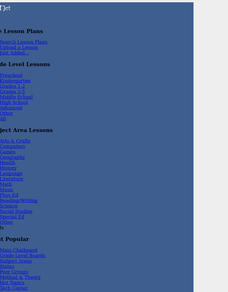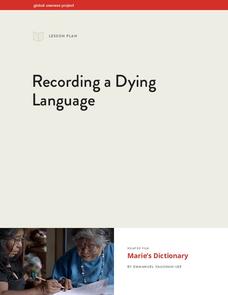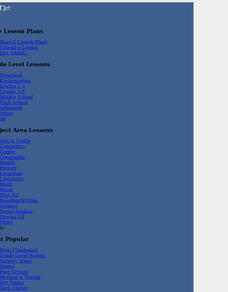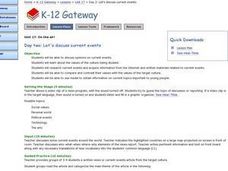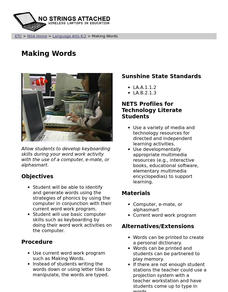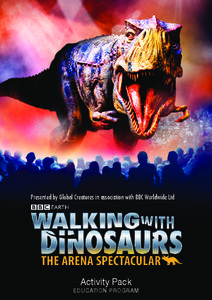Florida Center for Reading Research
Dictionary Cube
Young scholars investigate new vocabulary words with a fun, collaborative activity. Given a deck of word cards, pairs of students flip over one at a time and independently look up the term in a dictionary. They then take turns rolling a...
Curated OER
Dictionary Skills Review
Elementary and middle schoolers write 12 words in alphabetical order. They answer seven questions using the dictionary skills of pronunciation, breaking words into syllables and finding definitions. Then they answer five questions about...
Curated OER
Dictionary Skills
An online, interactive worksheet provides plenty of practice with using the dictionary. Learners look up and complete or correct 22 compound nouns and adjectives. They connect definitions of words that have affixes to the definitions of...
Curated OER
Guide Word Game
In pairs, learners describe and use guide words to locate words in a dictionary. This is a timed activity, where points can be earned by completing the goal first. Tip: Have kids look up weird words in the dictionary, and then come up...
Curated OER
Lesson Exchange: Is This A Real Word? (Elementary, Reading/Writing)
Young readers practice looking words up in the dictionary. This lesson describes a simple, yet engaging, game that can be played as a whole-class activity.
Curated OER
Dictionary Skills
Second graders use resources such as dictionaries and glossaries correctly to build word meaning and to practice all uses of their references; students also practice alphabetical order while locating information.
Global Oneness Project
Recording a Dying Langauge
Is there value in preserving indigenous languages that are almost extinct? That's the question posed to viewers of a short film about the attempt of one Native American woman who is creating a dictionary for Wakchumni, the language of...
Scholastic
Study Jams! The Kingdoms of Life
Life science learners discuss the characteristics of five kingdoms of life: animals, plants, fungi, protists, and bacteria in this video. Viewers find out from the dialogue that scientists group organisms according to similarities. This...
Curated OER
Learning About Homonyms
I don't know why but I love teaching homonym lessons. This one encourages learners to look up and write a definition for a set of 10 different homonyms. Tip: Put new knowledge to the test and have the class fix a story that contains...
Curated OER
Learning About The Dictionary
Learners explore how to use the dictionary. They practice finding words in the dictionary. Students find the word that is between two listed words and they find the word that does not belong in between the two listed words.
Curated OER
Dictionary Dig
Learners practice their alphabetizing through practice with a dictionary. They use alphabetizing skills to place words with proper guide words and to look up words in a dictionary.
Florida Center for Reading Research
Vocabulary: Words in Context, Meaning Maker
Support children with finding meaning in unknown words using this graphic organizer. While reading a piece of writing, learners identify unfamiliar words, using context clues and reference materials to find and record definitions before...
Curated OER
Alphabetical Order
This is a vocabulary worksheet with a twist! Young elementary-schoolers put these 13 words into alphabetical order before finding their meanings, uses, and origins. They will need to use reference materials, and may need some help...
Curated OER
Newsinary
Students demonstrate dictionary and vocabulary skills. They create an index card book containing a page for each letter of the alphabet that includes a word, definition, and sentence.
Curated OER
Let's Discuss Current Events
Investigate articles from the daily news and share opinions with classmates. Using current events, learners view a news program without sound and predict what news is being discussed by analyzing the visuals. Then they read news articles...
Pearson
Advice: Should, Shouldn't, Ought to, Had Better, and Had Better Not
You shouldn't miss out on an opportunity to review should, shouldn't, ought to, had better, and had better not! Elementary and middle schoolers view a slideshow presentation that focuses on usage rules and examples for...
Curated OER
Making Words
Young writers identify and generate words using the strategies of phonics on the Making Words computer program. Words are typed instead of having to use tiles or paper. Extension activities such as playing the memory game, drawing...
BBC
Walking with Dinosaurs
Breath new life into your class's study of dinosaurs with this extensive collection of materials. Offering everything from a printable T-rex mask, word searches, and connect-the-dots activities to informational handouts, hands-on...
Curated OER
Alphabetizing Vegetables
Students explore alphabetical order. In this language arts lesson, students are given a list of twenty vegetables and complete a worksheet putting the names of these vegetables in alphabetical order.
Curated OER
A Pill with a View
Students brainstorm a list of potential uses for micro-video technologies. After reading an article, they analyze the development of a new pill-sized camera. In groups, they create a children's book that shows them the various systems of...
Pimsleur
Dining Out in Brazil
Learn about Brazilian food and pick up some Portuguese vocabulary along the way. After studying the vocabulary, class members complete the provided worksheets. They then work in pairs to write sentences and play a vocabulary game as a...
Curated OER
Bird Up
Third graders identify basic physical and behavioral characteristics of birds and how they adapt to their environments. To organize and share scientific information with peers. They discuss similarities and differences among birds....
Curated OER
Possessive Pronouns and Possessive Adjectives
An interactive, online worksheet, designed with drop down menus and blank fields, provides 24 pronoun-related exercises for pupils to complete. The resource could be adapted for a paper and pencil exercise. Appropriate for upper...
Curated OER
Perimeter
Students study about perimeter and the units used to measure perimeter using a variety of materials including their hands, feet, rulers, and computer applets. They understand such attributes as length, area, weight, volume, and size of...







